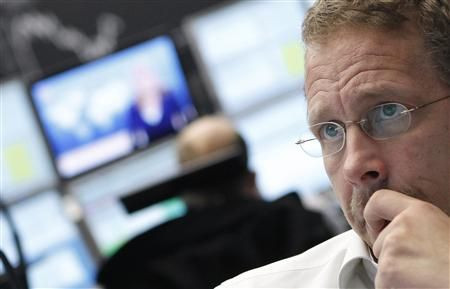European Markets Fall On Economic Concerns

European markets fell Tuesday as investor confidence was weighed down by increasing concerns of the debt crisis affecting the euro zone.
London’s FTSE 100 index fell 0.13 percent or 7.58 points to 5785.62. Shares of Kazakhmys PLC declined 2.04 percent and shares of Rio Tinto PLC dropped 1.60 percent.
The French CAC 40 index was down 0.14 percent or 5.05 points to 3501. Shares of Credit Agricole SA dropped 1.18 percent and shares of AXA SA fell 1.01 percent.
The German DAX 30 index marginally declined 0.06 percent or 4.30 points to 7209.40. Shares of Adidas AG fell 1.84 percent and shares of Volkswagen AG dropped 0.56 percent.
Spain's IBEX 35 was down 0.51 percent or 40.40 points to 7817.30. Shares of Telefonica SA fell 1.17 percent and shares of Acciona SA declined 2.54 percent.
Investors are focusing on the meeting between Greek Prime Minister Antonis Samaras and European Central Bank President Mario Draghi Tuesday in Frankfurt. There is worry that so far Greece has not met the ECB’s criteria where countries needing aid must meet fiscal conditions defined in the bail-out packages.
Also the troika, comprising the European Union, the ECB and the International Monetary Fund, has indicated that the Greek government must prove that it would meet the conditions, which it had failed to comply with earlier in the first few months of its programme, before it considers renegotiating the existing deal.
“If the ECB were to provide Greece with support, it would probably either have to purchase short-dated bonds directly from the government, or encourage private buyers to buy them by guaranteeing to purchase them subsequently. The Bundesbank and others would argue that either of these actions would breach the ECB’s rules,” said Capital Economics in a note.
Investors are also concerned about the risk that divisions within the troika may build up and eventually prompt the bailout to break down, leaving the ECB with no deal to rescue.
© Copyright IBTimes 2025. All rights reserved.





















